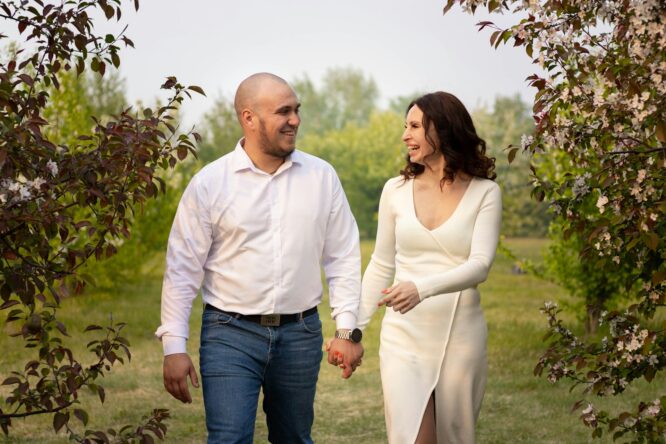Fights don’t ruin relationships—poor repair habits and constant miscommunication do.

The truth is, most arguments don’t start with big issues. They start with tone, timing, or a tiny misstep that spirals. However, the couples who argue less aren’t magically more compatible—they’ve just picked up certain habits that help stop conflict before it explodes. Here are some simple but powerful habits that help reduce fighting and keep connection intact. You should try these in your own life—you’ll be surprised at how effective they are.
1. They pause before reacting to things that trigger them.

It’s not bottling things up—it’s creating space between the trigger and the response. That short pause can be the difference between a calm reply and a defensive outburst. Couples who argue less often take a breath, a beat, or even a step away before responding when something lands wrong. That space helps stop knee-jerk reactions from escalating a minor moment into a full-blown fight.
2. They check their tone—yes, even when they’re frustrated.
 Source: Unsplash
Source: Unsplash You can say the right thing in the wrong tone and instantly spark defensiveness. Couples who fight less know that how you say something often matters more than what you say. They keep their tone soft when possible, even when setting boundaries or raising issues. They’re not sugarcoating things to keep the peace. Instead, they’re focused on making the conversation safe to receive.
3. They pick the right moment to bring things up.
 Source: Unsplash
Source: Unsplash Dumping a heavy conversation on someone when they’re stressed, tired, or distracted rarely goes well. Couples who’ve learned to argue less have also learned the value of timing. They’ll wait for a neutral moment, ask if now’s a good time, or simply say, “Can we talk later?” It’s a habit of consideration, not avoidance, and it helps the other person show up with their full attention.
4. They clarify what the argument is actually about.
 Source: Unsplash
Source: Unsplash Many fights aren’t really about the dishes or the text message—it’s about feeling unseen, disrespected, or overwhelmed. Couples who argue less know how to zoom out and ask, “What’s really going on here?” They don’t just chase surface-level issues. They try to get to the emotional root. That clarity saves them from having the same fight on repeat in different disguises.
5. They speak from “I” instead of “You.”
 Source: Unsplash
Source: Unsplash Starting with “You always” or “You never” almost guarantees a defensive response. Couples who communicate better stick with “I feel,” “I noticed,” or “I need.” It keeps the focus on their experience instead of turning it into an accusation. That one small change can radically change how a tough conversation unfolds.
6. They name what they need instead of expecting mind reading.

They don’t stew in silence or expect their partner to magically pick up on passive-aggressive hints. They say what they need, even if it feels awkward or vulnerable. It might be, “I need more reassurance when I’m anxious” or “I need some space before we talk about this.” Saying it directly removes guesswork, and unnecessary friction.
7. They repair quickly, even if the issue isn’t fully resolved.

Arguments happen, but couples who fight less don’t wait hours (or days) to reconnect. They’ll say, “We’re not done, but I still love you,” or “Can we pause and come back to this later?” They don’t let the cold war drag out. Even a small gesture—like a hand on the back or a gentle text—can break tension before it hardens into resentment.
8. They own their part without being pushed.

Blame ping-pong keeps fights going. However, couples who resolve things faster take responsibility without needing to be guilted into it. They’ll say, “I got defensive just now,” or “That tone wasn’t fair, sorry.” This habit builds trust. It shows emotional maturity and invites the other person to do the same without feeling attacked.
9. They know when to drop it.

Not every disagreement needs a full debrief. Couples who fight less don’t turn every eye roll into a summit. If something small happens but doesn’t really matter, they let it go instead of milking it for tension. That doesn’t mean they ignore important things—it means they don’t over-invest in things that aren’t worth the emotional cost.
10. They show appreciation in daily, unprompted ways.

When someone feels seen and valued on the regular, they’re less likely to react strongly to minor conflicts. Couples who argue less usually show regular appreciation—little thank yous, compliments, or moments of warmth. That habit builds emotional reserves, so when conflict does happen, it’s happening on solid ground—not thin ice.
11. They don’t use silence as a weapon.

Taking space is healthy. Stonewalling is not. Partners who fight less communicate when they need a break, and they come back when they’re ready. They don’t leave each other stewing in confusion. They might say, “I need a breather, but I’ll check in tonight.” That clarity prevents unnecessary guessing games and hurt feelings.
12. They listen to understand, not just to reply.

Many arguments escalate because both people are waiting to speak, not actually listening. Couples who fight less have trained themselves to really hear what’s being said—especially in tense moments. They reflect back, ask clarifying questions, and stay curious. It’s a habit that defuses tension and shows, “I care more about understanding you than winning this.”
13. They joke (gently) to soften tension.

A well-timed bit of humour or banter, when used with care, can de-escalate a brewing fight. Couples who know how to laugh together often use that as a pressure valve. It’s not an excuse to dismiss the issue. It’s about saying, “We’re okay, even when we’re annoyed.” That shared lightness can reset the emotional tone and make hard conversations easier to finish.
14. They check in regularly, not just when things explode.

They don’t wait until something boils over to talk about how things are going. A quick “How are we doing?” check-in every week or two keeps things flowing before resentment builds. This habit means there’s less backlog of unspoken stuff—and fewer surprise blowups over things that have been silently festering.
15. They assume goodwill instead of jumping to the worst conclusion.

When something comes out wrong, they don’t automatically assume malice. They give each other the benefit of the doubt, ask for clarification, or at least pause before interpreting the worst. The default toward trust instead of suspicion lowers defensiveness and keeps communication more open. It creates a buffer between frustration and escalation.
16. They remember they’re on the same team.

This is the core of it. Even mid-disagreement, couples who argue less don’t forget that they’re partners, not opponents. They try to solve the issue, not attack the person. That mindset changes the entire tone of conflict. It’s not “me versus you”—it’s “us versus this issue.” That change makes all the difference.




